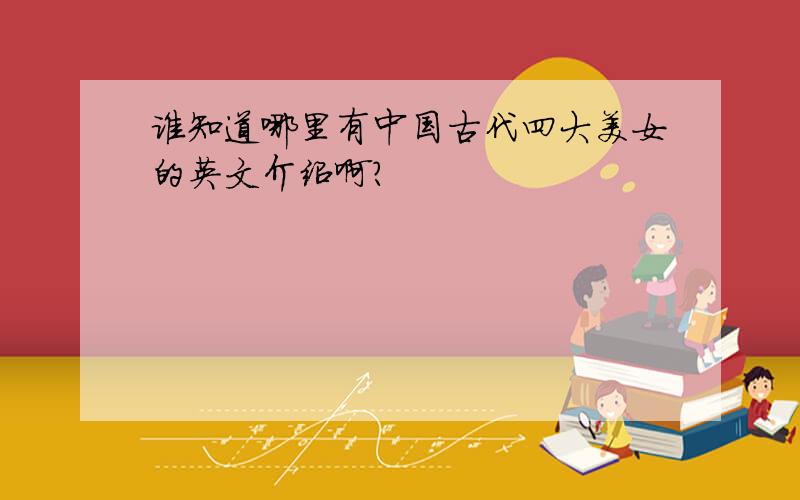谁知道哪里有中国古代四大美女的英文介绍啊?
来源:学生作业帮助网 编辑:作业帮 时间:2024/04/29 10:09:23

谁知道哪里有中国古代四大美女的英文介绍啊?
谁知道哪里有中国古代四大美女的英文介绍啊?
谁知道哪里有中国古代四大美女的英文介绍啊?
Four Beauties
The Four Beauties (Chinese:四大美人; Pinyin:sì dà měi rén) are four ancient Chinese women,renowned for their beauty.Though actual historical figures,their stories have been greatly embellished by legend.
According to legend,they are the most beautiful women of ancient China,and among the most significant as well.They have remained famous because of their effect on the emperors and kings with whom they were involved.Some brought kingdoms or dynasties to their knees.Most ended their lives in tragedy or mystery.
They are,in chronological order:
Xi Shi (c.seventh to sixth century BC,Spring and Autumn Period),said to be "so beautiful as to make swimming fish sink"
Wang Zhaojun (c.first century BC,Western Han Dynasty),said to be "so beautiful as to make flying geese fall"
Diao Chan (c.third century,Three Kingdoms period),said to have "a face that would make the full moon hide behind the clouds"
Yang Guifei (719-756,Tang Dynasty),said to have "a face that would make all flowers feel shameful"
Within Chinese literature,the Four Beauties are described as the fairest of all while still having some down-to-earth qualities.For instance,Xi Shi is believed by some to have had bigger feet than normal ladies of her time (though they might be common size nowadays),and to wince from chest pains.Yang Guifei is believed to have had an unpleasant odor (it is believed to be the reason she made several bathing ponds and was famous for creating scented powder) and is also said to have been rather plump.These flaws only serve to make their stories more realistic.
It should be noted that no historical accounts mention a person named Diao Chan; while Hou Han Shu discuss a servant girl of Dong Zhuo's with whom Lü Bu had an affair,she was not named.Moreover,"Diao" is not a common Chinese last name,but diao chan was a term commonly used to describe top officials' hat decorations during the subsequent Jin Dynasty.
This entry is from Wikipedia,the leading user-contributed encyclopedia.It may not have been reviewed by professional editors (see full disclaimer)